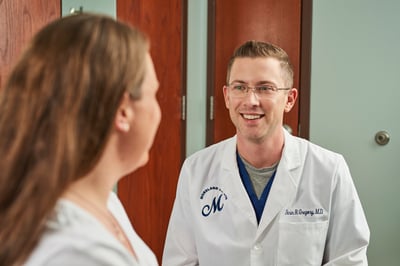Are you amoung five million U.S. women with Polycystic Ovarian Syndrome (PCOS)?
About 1 in 10 women of childbearing age have this condition, which creates a hormonal imbalance and other metabolic problems.
PCOS can affect many aspects of a woman’s health and life, including weight, hair, skin, energy, sleep, mood, reproductive health, and fertility. Although the “cystic” part of the condition’s name implies that all women with PCOS have ovarian cysts, you don’t have to have cysts on your ovaries to be diagnosed, as some women with PCOS have cysts and some don’t.
What is PCOS?
PCOS is a metabolic disorder that strongly affects the endocrine and reproductive systems and contributes to cardiac disease and obesity. It is most commonly diagnosed in women aged 15 to 44, including women in their 20s and 30s who struggle to become pregnant.
Although the exact cause of PCOS is unknown, research indicates that it may be a combination of genetic and environmental factors. High levels of androgens and insulin in women with PCOS suggest that the cause is hormonal, but it is unclear how and why certain women develop this imbalance.
Women with PCOS may need the help of an array of clinicians to manage their condition and cope with their symptoms. These include a fertility specialist and an obstetrician/gynecologist.
What are the Symptoms of PCOS?
The earliest symptoms of PCOS are typically experienced during puberty when young women notice irregular periods, weight gain, headaches, and pelvic pain with or without their period. It’s also possible to have PCOS and have very mild to no symptoms. Because of this, many individuals do not realize they have PCOS until they have trouble getting pregnant or start to gain weight for unknown reasons.
 Polycystic Ovarian Syndrome symptoms for women of all ages typically include:
Polycystic Ovarian Syndrome symptoms for women of all ages typically include:
- Sleeplessness. Women with PCOS are more likely to have sleep apnea, which is a condition where the person stops breathing for short periods while sleeping.
- Fatigue. Low energy is a common symptom often related to poor sleep quality from PCOS.
- Hirsutism. Hirsutism is the medical term for excess hair growth. Women with PCOS often develop hairy areas on the abdomen, feet, chest, back, arms, upper lip, chin, and cheeks.
- Thinning hair. While excess hair growth from PCOS is a problem on other parts of the body, women with PCOS tend to have thinning of hair on the top of the head. They may develop something similar to male pattern baldness or baldness on the top front of the head.
- Acne. Skin problems are common in women with PCOS. Problems can include acne, darkened skin, and skin tags.
- Weight gain. About 50-percent of women with PCOS have weight gain that is difficult to combat, even with a traditional exercise and diet regimen.
- Fertility issues. PCOS is one of the top causes of female infertility but not all women with PCOS are infertile, and some conceive naturally without assistance.
- Mood instability. When you have PCOS, you are more likely to experience mood fluctuation , depression, and anxiety. For some women, this worsens around the time of their period.
- Period irregularity. Periods may arrive irregularly or alternate between a very heavy and lighter flow or spotting. Bleeding could also be heavy month after month.
- Ovarian Cysts. Some women, but not all, develop cysts on their ovaries with PCOS. These cysts are an accumulation of immature follicles, and the number of cysts tends to decrease with age.
Are you experiencing missed or irregular periods? Learn more about menstrual cycle problems here!
PCOS and Infertility
PCOS infertility is quite common due to the related condition of anovulation (or irregular ovulation). The prevalence of infertility in women with PCOS is about 70- to 80-percent.
Women who experience fertility problems due to PCOS shouldn’t give up hope. By managing PCOS symptoms, women can often improve their fertility. Managing PCOS Symptom may involve a health plan that includes weight loss, medication, and other medical procedures.
Your gynecologist or obstetrician can also support you with additional information about natural fertility options that can help you boost your fertility and increase the odds of becoming pregnant.
At Moreland OB-GYN, we believe in compassionate, collaborative patient care. Our caring providers will be your trusted partner in your fertility journey, providing you with the best resources and care possible. Learn more about our fertility services and care.
PCOS Risk Factors
It is difficult to pinpoint precisely what puts someone at a higher risk of PCOS, but research indicates two primary risk factors: having a mother or sister with PCOS and being obese. Although most women with PCOS are overweight, it’s still possible for patients with a normal body mass index (BMI) to have PCOS.
Two additional characteristics are common in women with PCOS: insulin resistance and the ovaries or adrenal glands producing higher-than-normal testosterone leading to excess androgens levels. However, there is no clear cause-and-effect relationship between these conditions and PCOS.
Women with PCOS are also more likely to develop other health conditions, including clinical obesity, fatty liver disease, cardiac disease, and diabetes. According to the National Polycystic Ovarian Syndrome Association, women with PCOS constitute the largest group at risk for cardiovascular disease and type 2 diabetes.
PCOS Testing and Treatment Options
 It is important to understand that there is no single PCOS test. To diagnose it, your doctor will likely perform a variety of tests that indicate PCOS may be present, which could include testing your:
It is important to understand that there is no single PCOS test. To diagnose it, your doctor will likely perform a variety of tests that indicate PCOS may be present, which could include testing your:
- Blood pressure
- Glucose tolerance
- Cholesterol
- Triglyceride levels
- Hormones
Regarding PCOS treatment, you may receive a recommendation for a Polycystic Ovarian Syndrome diet involving calorie reduction, limiting carbohydrates and sugar, and increasing your protein and green leafy vegetable intake. Many women find, and some studies show, that a PCOS diet relieves symptoms and prevents the condition from worsening.
Learn about maintaining a healthy diet here!
In addition, your provider may recommend screening you for depression, anxiety and sleep apnea. This screening will help you understand how the condition affects your mental and physical well-being.
There are certain medications your provider might prescribe for Polycystic Ovarian Syndrome treatment, including hormonal birth control, anti-androgens, and Metformin. However, some of these are not recommended for women intending to become pregnant, so always discuss your plans with your doctor.
Understanding the different types of hormonal birth control options is the key to choosing the best one for your body when managing PCOS symptoms. Read our comprehensive birth control guide to learn more!
When to See Your Doctor About PCOS
Talk to your provider to discuss PCOS if:
- You have never been diagnosed, but you are concerned with your current symptoms
- You have irregular periods or do not get periods on your own
- You have a PCOS diagnosis and are having trouble managing your condition
Be sure to talk to your OB-GYN provider about any PCOS symptoms that have arisen or have begun to worsen: painful cramping with periods, fatigue, thinning hair, excess hair, acne, weight gain, moodiness, heavy or irregular periods, or trouble conceiving.
Early detection is vital with PCOS because intervention can help prevent damage to your heart, liver, pancreas, reproductive system, mental wellness, and more. With the help of your Moreland OB-GYN provider, you can manage PCOS symptoms with a personalized plan tailored specifically to your needs.

At Moreland OB-GYN, we promote overall excellence in women’s health care. Our compassionate providers understand the difficulties women face in their daily health, whether it is unexplainable pain or unusual symptoms. We are here to listen and provide our expert care.
For more information about PCOS, request an appointment with Moreland OB-GYN









